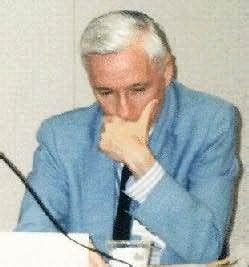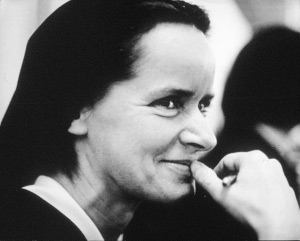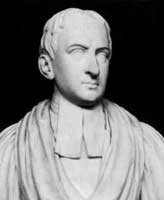Top 595 Proceed Quotes & Sayings - Page 10
Explore popular Proceed quotes.
Last updated on April 18, 2025.
First shalt thou take out the Holy Pin. Then shalt thou count to three, no more-no less. Three shall be the number thou shalt count, and the number of the counting shall be three. Four shalt thou not count, neither count thou two, excepting that thou then proceed to three. Five is right out. Once the number three, being the third number, be reached, then lobbest thou thy Holy Hand Grenade of Antioch towards thy foe, who, being naughty in my sight, shall snuff it.
It equally proves, that though individual oppression may now and then proceed from the courts of justice, the general liberty of the people can never be endangered from that quarter; I mean so long as the judiciary remains truly distinct from both the legislature and the Executive. For I agree, that "there is no liberty, if the power of judging be not separated from the legislative and executive powers." And it proves, in the last place, that as liberty can have nothing to fear from the judiciary alone, but would have every thing to fear from its union with either of the other departments.
In the entire history of the universe, let alone in your own history, there has never been another day just like today, and there will never be another just like it again. Today is the point to which all your yesterdays have been leading since the hour of your birth. It is the point from which all your tomorrows will proceed until the hour of your death. If you were aware of how precious today is, you could hardly live through it. Unless you are aware of how precious it is, you can hardly be said to be living at all.
Do not allow past experiences to be imprinted on your mind. Perform asanas each time with a fresh mind and with a fresh approach. If you are repeating what you did before, you are living in the memory, so you are living in the past. That means you don't want to proceed beyond the experience of the past. Retaining that memory is saying, 'Yesterday I did it like that.' When I ask, 'Is there anything new from what I did yesterday?' then there is progress. Am I going forward or am I going backward? Then you understand how to create dynamism in a static asana.
All children are heartless. They have not grown a heart yet, which is why they can climb tall trees and say shocking things and leap so very high that grown-up hearts flutter in terror. Hearts weigh quite a lot. That is why it takes so long to grow one. But, as in their reading and arithmetic and drawing, different children proceed at different speeds. (It is well known that reading quickens the growth of a heart like nothing else.) Some small ones are terrible and fey, Utterly Heartless. Some are dear and sweet and Hardly Heartless at all.
Heaven does nothing: its non-doing is its serenity. Earth does nothing: its non-doing is its rest. From the union of these two non-doings All actions proceed. All things are made. How vast, how invisible This coming-to-be! All things come from nowhere! How vast, how invisible No way to explain it! All beings in their perfection Are born of non-doing. Hence it is said: Heaven and earth do nothing Yet there is nothing they do not do. Where is the man who can attain To this non-doing?
There is no one way to salvation, whatever the manner in which a man may proceed. All forms and variations are governed by the eternal intelligence of the Universe that enables a man to approach perfection. It may be in the arts of music and painting or it may be in commerce, law, or medicine. It may be in the study of war or the study of peace. Each is as important as any other. Spiritual enlightenment through religious meditation such as Zen or in any other way is as viable and functional as any "Way."... A person should study as they see fit.
Do not ask the stones or the trees how to live, they can not tell you ; they do not have tongues; do not ask the wise man how to live for, if he knows , he will know he cannot tell you; if you would learn how to live , do not ask the question; its answer is not in the question but in the answer, which is not in words; do not ask how to live, but, instead, proceed to do so.
a novelist's chief desire is to be as unconscious as possible. He has to induce in himself a state of perpetual lethargy. He wants life to proceed with the utmost quiet and regularity. He wants to see the same faces, to read the same books, to do the same things day after day, month after month, while he is writing, so that nothing may break the illusion in which he is living - so that nothing may disturb or disquiet the mysterious nosings about, feelings around, darts, dashes, and sudden discoveries of that very shy and illusive spirit, the imagination.
In real science a hypothesis can never be proved true...A science which confines itself to correlating phenomena can never learn anything about the reality underlying the phenomena, while a science which goes further than this and introduces hypotheses about reality, can never acquire certain knowledge of a positive kind about reality; in whatever way we proceed, this is forever denied us.
We have a friend and protector, from whom, if we do not ourselves depart from Him, nor power nor spirit can separate us. In His strength let us proceed on our journey, through the storms, and troubles, and dangers of the world. However they may rage and swell, though the mountains shake at the tempests, our rock will not be moved: we have one friend who will never forsake us; one refuge, where we may rest in peace and stand in our lot at the end of the days. That same is He who liveth, and was dead; who is alive forevermore; and hath the keys of hell and of death.
There must be only three supreme values which govern a person's life: Reason, Purpose, and Self-esteem. Reason, as his only tool of knowledge--Purpose, as his choice of the happiness which that tool must proceed to achieve--Self-esteem, as his inviolate certainty that his mind is competent to think and his person is worthy of happiness, which means: is worthy of living. These three values imply and require all of man's virtues, and all his virtues pertain to the relation of existence and consciousness: rationality, independence, integrity, honesty, justice, productiveness, pride.
But to proceed; as in order and place, so also in matter of her Creation, Woman far excells Man. things receive their value from the matter they are made of, and the excellent skill of their maker: Pots of common clay must not contend with China-dishes, nor pewter utensils vye dignity with those of silver.... Woman was not composed of any inanimate or vile dirt, but of a more refined and purified substance, enlivened and actuated by a Rational Soul, whose operations speak it a beam, or bright ray of Divinity.
Certainly there are things worth believing. I believe in the brotherhood of man and the uniqueness of the individual. But if you ask me to prove what I believe, I can't. You know them to be true but you could spend a whole lifetime without being able to prove them. The mind can proceed only so far upon what it knows and can prove. There comes a point where the mind takes a leap—call it intuition or what you will—and comes out upon a higher plane of knowledge, but can never prove how it got there. All great discoveries have involved such a leap.
Time, which measures everything in our idea, and is often deficient to our schemes, is to nature endless and as nothing; it cannot limit that by which alone it had existence; and as the natural course of time, which to us seems infinite, cannot be bounded by any operation that may have an end, the progress of things upon this globe, that is, the course of nature, cannot be limited by time, which must proceed in a continual succession.
If you are receptive and humble, mathematics will lead you by the hand. Again and again, when I have been at a loss how to proceed, I have just had to wait until I have felt the mathematics led me by the hand. It has led me along an unexpected path, a path where new vistas open up, a path leading to new territory, where one can set up a base of operations, from which one can survey the surroundings and plan future progress.
The student who would build his knowledge on solid foundations, and proceed by just degrees to the pinnacles of truth, is directed by the great philosopher of France to begin by doubting of his own existence. In like manner, whoever would complete any arduous and intricate enterprise, should, as soon as his imagination can cool after the first blaze of hope, place before his own eyes every possible embarrassment that may retard or defeat him. He should first question the probability of success, and then endeavour to remove the objections that he has raised.
Like the vital rudder of a ship, we have been provided a way to determine the direction we travel. The lighthouse of the Lord beckons to all as we sail the seas of life. Our home port is the celestial kingdom of God. Our purpose is to steer an undeviating course in that direction. A man without a purpose is like a ship without a rudder—never likely to reach home port. To us comes the signal: Chart your course, set your sail, position your rudder, and proceed.
When the mind becomes so completely absorbed in perfect health that all sickness is forgotten, all the powers of mind will proceed to create health, and every trace of sickness will soon disappear. When the mind becomes so completely absorbed in higher attainments and in greater achievements that all thought of failure is forgotten, all the forces of mind will begin to work for the promotion of those attainments and achievements. The person will be gaining ground every day, and greater success will positively follow.
Gaia's main problems are not industrialization, ozone depletion, overpopulation, or resource depletion. Gaia's main problem is the lack of mutual understanding and mutual agreement in the noosphere about how to proceed with those problems. We cannot rein in industry if we cannot reach mutual understanding and mutual agreement based on a worldcentric moral perspective concerning the global commons. And we reach the worldcentric moral perspective through a difficult and laborious process of interior growth and transcendence.
If you can't fail then how can you possible develop as a communicator or as a creator of anything? We are locked into a deeply unhealthy notion that somehow you've got to succeed all the time. An appalling notion. Any painter or writer will tell you that that is no way to proceed. One of the things that will kill off a decent actor, especially a young actor early on and they will never recover from it, is too much success. It's disastrous. You stop being criticized, therefore you stop challenging yourself. You then can't afford to fail because there's too far to fall.
This most beautiful system of the sun, planets and comets could only proceed from the counsel and dominion of an intelligent and powerful Being. And if the fixed stars are the centres of other like systems, these, being formed by the like wise counsel, must be all subject to the dominion of One; especially since the light of the fixed stars is of the same nature with the light of the sun.
I recommend allowing others the opportunity to fully express themselves before turning our attention to solutions or requests for relief. When we proceed too quickly to what people might be requesting, we may not convey our genuine interest in their feelings and needs; instead, they may get the impression that we're in a hurry to either be free of them or to fix their problem. Furthermore, an initial message is often like the tip of an iceberg; it may be followed by yet unexpressed, but related - and often more powerful - feelings.
We all have a suspicion and hope that we've just been part of something special, something that may eventually change our lives. That no one else knows this makes it seem like we are living with a secret that we would like to share, but can't, sort of like having a superpower that's not come online or being president elect. For the moment, our lives proceed as usual, but within a month, we think, everything will change. It's a frustrating, if exciting, disconnect.
People were standing up everywhere shouting, "This is me! This is me!" Every time you looked at them they stood up and told you who they were, and the truth of it was that they had no more idea who or what they were than he had. They believed their flashing signs, too. They ought to be standing up and shouting, "This isn't me! This isn't me!" They would if they had any decency. "This isn't me!" Then you might know how to proceed through the flashing bullshit of this world.
People take it for granted that the physical world is both ordered and intelligible. The underlying order in nature - the laws of physics - are simply accepted as given, as brute facts. Nobody asks where they came from; at least not in polite company. However, even the most atheistic scientist accepts as an act of faith that the universe is not absurd, that there is a rational basis to physical existence manifested as law-like order in nature that is at least partly comprehensible to us. So science can proceed only if the scientist adopts an essentially theological worldview.
Crush your individuality first. Shake off the dreams of personal comfort. Then start to work. Inch by inch you shall have to proceed. It needs courage, perseverance and very strong determination. No difficulties and no hardships shall discourage you. No failure and betrayals shall dishearten you. No travails (!) imposed upon you shall snuff out the revolutionary will in you. Through the ordeal of sufferings and sacrifice you shall come out victorious. And these individual victories shall be the valuable assets of the revolution.
Creationists argue that natural selection is only a negative process, and therefore cannot create anything. Chopra argues that skepticism is only a negative process, and therefore does not lead to knowledge. Both are wrong for the same reasons. They ignore the generation of diversity and new ideas upon which natural selection and skepticism acts. Weeding out the unfit is critical to both - natural selection allows evolution to proceed, and skepticism allows science to advance.
Bahá'u'lláh is not the Intermediary between other Manifestations and God. Each has His own relation to the Primal Source. But in the sense that Bahá'u'lláh is the greatest Manifestation to yet appear, the One Who consummates the Revelation of Moses; He was the One Moses conversed with in the Burning Bush. In other words Bahá'u'lláh identifies the glory of the Godhead on that occasion with Himself. No distinction can be made amongst the Prophets in the sense that They all proceed from One Source, and are of One Essence. But Their stations and functions in this world are different.
America, like Britain before her, is now the great defender of the Status Quo. She has committed herself against revolution and radical change in the underdeveloped world because independent governments would destroy the world economic and political system, which assures the United States its disproportionate share of economic and political power ... America's preeminent wealth depends upon keeping things in the underdeveloped world much as they are, allowing change and modernization to proceed only in a controlled, orderly, and nonthreatening way.
When you are not separate from the creative process, time ceases to exist. You might start to feel tired and suddenly realize that much time has passed. It isn't necessarily a happy time - and may be very difficult to start if it is a job or an obligation. But if' you start with all the concrete needs and proceed in a thorough way - the creative process will take over and you will forget whether it is work or play. Working in the here and now is one of the most uncontaminated ways to work.
Promise to give me a kiss on my brow when I am dead. --I shall feel it." She dropped her head again on Marius' knees, and her eyelids closed. He thought the poor soul had departed. Eponine remained motionless. All at once, at the very moment when Marius fancied her asleep forever, she slowly opened her eyes in which appeared the sombre profundity of death, and said to him in a tone whose sweetness seemed already to proceed from another world:-- "And by the way, Monsieur Marius, I believe that I was a little bit in love with you.
All ills spring from some vice, either in ourselves or others; and even many of our diseases proceed from the same origin. Remove the vices; and the ills follow. You must only take care to remove all the vices. If you remove part, you may render the matter worse. By banishing vicious luxury, without curing sloth and an indifference to others, you only diminish industry in the state, and add nothing to men's charity or their generosity.
The press box at Wrigley Field in Chicago is an extended narrow shed, two rows deep, that is precariously bolted to the iron rafters just underneath the park's second deck. To gain access, one must climb a steeply angled ramp and clamber down a little starboard companionway, guarded at its foot by a uniformed minion and then proceed giddily along a catwalk that hangs directly above the tiered, circling rows of seats and spectators behind home plate.
The hope of a Christian is inseparable from his faith. Whoever believes in the divine inspiration of the Holy Scriptures must hope that the religion of Jesus shall prevail throughout the earth. Never since the foundation of the world have the prospects of mankind been more encouraging to that hope than they appear to be at the present time. And may the associated distribution of the Bible proceed and prosper till the Lord shall have made 'bare His holy arm in the eyes of all the nations, and all the ends of the earth shall see the salvation of our God' (Isaiah 52:10).
The calamities of tragedy do not simply happen, nor are they sent; they proceed mainly from actions, and those the actions of men.We see a number of human beings placed in certain circumstances; and we see, arising from the co-operation of their characters in these circumstances, certain actions. These actions beget others, and these others beget others again, until this series of inter-connected deeds leads by an apparently inevitable sequence to a catastrophe.
The sad part is that all we're trying to do is not feel that underlying uneasiness. The sadder part is that we proceed in such a way that the uneasiness only gets worse. The message here is that the only way to ease our pain is to experience it fully. Learn to stay. Learn to stay with uneasiness, learn to stay with the tightening, learn to stay with the itch and urge of shenpa, so that the habitual chain reaction doesn't continue to rule our lives, and the patterns that we consider unhelpful don't keep getting stronger as the days and months and years go by.
You must earn what you have. Life does not give you anything. You must give in order to get. You must stand up to the very thing that challenges you, look it in the face, get clear about your intention, order your thoughts and your life, and proceed without fear or hesitation. Life is not unfair. Along the way, you will always find bits of information and support to guide you to purpose.
But shall gravity be therefore called an occult cause, and thrown out of philosophy, because the cause of gravity is occult and not yet discovered? Those who affirm this, should be careful not to fall into an absurdity that may overturn the foundations of all philosophy. For causes usually proceed in a continued chain from those that are more compounded to those that are more simple; when we are arrived at the most simple cause we can go no farther ... These most simple causes will you then call occult and reject them? Then you must reject those that immediately depend on them.
All literature, highbrow or low, from the Aeneid onward, is fan fiction....Through parody and pastiche, allusion and homage, retelling and reimagining the stories that were told before us and that we have come of age loving--amateurs--we proceed, seeking out the blank places in the map that our favorite writers, in their greatness and negligence, have left for us, hoping to pass on to our own readers--should we be lucky enough to find any--some of the pleasure that we ourselves have taken in the stuff that we love: to get in on the game. All novels are sequels; influence is bliss.
If we would find God amid all the religious externals we must first determine to find Him, and then proceed in the way of simplicity. Now as always God discovers Himself to "babes" and hides Himself in thick darkness from the wise and the prudent. We must simplify our approach to Him. We must strip down to essentials (and they will be found to be blessedly few). We must put away all effort to impress, and come with the guileless candor of childhood. If we do this, without doubt God will quickly respond.
Dancing and building are the two primary and essential arts. The art of dancing stands at the source of all the arts that expressthemselves first in the human person. The art of building, or architecture, is the beginning of all the arts that lie outside the person; and in the end they unite. Music, acting, poetry proceed in the one mighty stream; sculpture, painting, all the arts of design, in the other. There is no primary art outside these two arts, for their origin is far earlier than man himself; and dancing came first.
But yet it is evident that religion consists so much in affection, as that without holy affection there is no true religion; and no light in the understanding is good which does not produce holy affection in the heart: no habit or principle in the heart is good which has no such exercise; and no external fruit is good which does not proceed from such exercises.
I have a fairly unwieldy set of concerns that go into determining what I do in the paintings, such as the history of the decorative, patterns of cultural migration, Islamic art and design, Byzantine architecture, the annals of natural history, as well as contemporary painting. All of these things are filtered through my own sense of cultural urgency. How I proceed with the work has to do with how I respond to this instinctively chosen mass of materials. I'm weighing many things and making many decisions before I even get started on a painting.
How would you describe the spiritual aroma of your home? The source of this aroma is the relationship between husband and wife. Many can fake an attempt at keeping God’s standards in some external way. What we cannot fake is the resulting, distinctive aroma of pleasure to God. Most marriage books address the mere externals of marriage, without seeking to understand the heart issues. Godly marriages proceed from an obedient heart, and the greatest desire of an obedient heart is the glory of God, not the happiness of the household.
Nevertheless, he must be cautious in believing and acting, and must not inspire fear of his own accord, and must proceed in a temperate manner with prudence and humanity, so that too much confidence does not render him incautious, and too much diffidence does not render him intolerant. From this arises the question whether it is better to be loved more than feared, or feared more than loved.
It was a figure painting class, where you had a model, and [Robert von Neumann ] would wander around and he'd come up behind someone and say, "Well, what are you trying to do?" And if you told him what you were trying to do, he would then proceed to discuss this with you and suggest things that you might look at and ways in which you could improve what you were attempting to do, etc - never worked on your painting, never touched your painting but talked extensively about what you were trying to do.
You could only draw conclusions about my personal sexual politics if you proceed from the assumption that I was presenting the characters as the way it is and the way it ought to be. But both are clearly defined as deranged – it’s love among the mad. He’s a psycopath, so is she. She’s prepared to throw him to the dogs until he works out the code, he’s prepared to let her nearly get executed. They’re not really going to buy a house and a Volvo together. I’m not saying this is how people should date!
Either all things proceed from one intelligent source and come together as in one body, and the part ought not to find fault with what is done for the benefit of the whole; or there are only atoms, and nothing else than a mixture and dispersion. Why, then, art thou disturbed? Say to this ruling faculty, Art thou dead, art thou corrupted, art thou playing the hypocrite, art thou become a beast, dost thou herd and feed with the rest?
Ordinarily rivers run small at the beginning, grow broader and broader as they proceed, and become widest and deepest at the point, where they enter the sea. It is such rivers that the Christian's life is like. But the life of the mere worldly man is like those rivers in Southern Africa, which, proceeding from mountain freshets, are broad and deep at the beginning, and grow narrower and more shallow as they advance. They waster themselves by soaking into the sands, and at last they die out entirely. The farther they run the less there is of them.
And how high is Christ's cross? As high as the highest heaven, and the throne of God, and the bosom of the Father that bosom out of which forever proceed all created things. Ay, as high as the highest heaven! for if you will receive it when Christ hung upon the cross, heaven came down on earth, and earth ascended into heaven.
The university is one of various funding structures by which people who want to do theoretical work stay alive, the same way that people go to grad school, not because they think it's going to change the world but because there's no patron system anymore, and they need some scaffolding of support while they're trying to figure out how they can proceed in their lives. I think that's utterly legit. A lot of our better theorists and thinkers, that's what the university is for them.
In our own times, you see, an emperor came to the city of Rome, where there's the temple of an emperor, where there's a fisherman's tomb. And so that pious and Christian emperor, wishing to beg for health, for salvation from the Lord, did not proceed to the temple of a proud emperor, but to the tomb of a fisherman, where he could imitate that fisherman in humility, so that he, being thus approached, might then obtain something from the Lord, which a haughty emperor would be quite unable to earn.
Now the man on duty used to be changed from time to time. Once one of these men, without giving me the slightest warning, without even asking me to leave the footpath, pushed and kicked me into the street. I was dismayed. Before I could question him as to his behaviour, Mr Coates, who happened to be passing the spot on horseback, hailed me and said: 'Gandhi, I have seen everything. I shall gladly be your witness in court if you proceed against the man. I am very sorry you have been so rudely assaulted.'
Our vow of chastity is nothing but our undivided love for Christ in chastity, then we proceed to the freedom of poverty-poverty is nothing but freedom. And that total surrender is obedience. If I belong to God, if I belong to Christ, then he must be able to use me. That is obedience. Then we give wholehearted service to the poor. That is service. They complete each other. That is our life.






















































